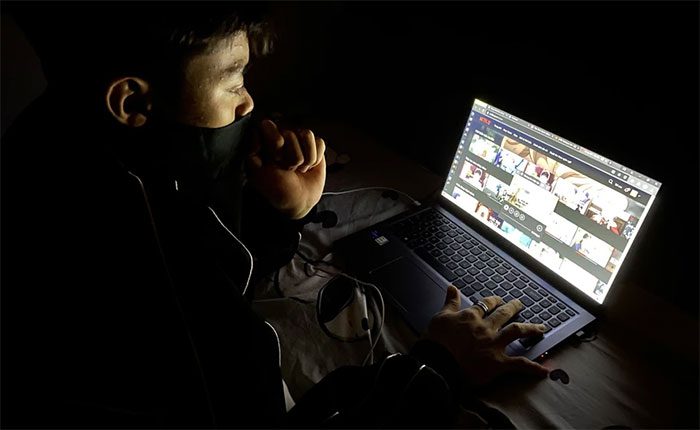Many young people are turning themselves into “night owls” due to their obsession with binge-watching movies. This not only affects their academic performance but can also severely impact their health while they are still in school.
From Entertainment to “Film Addict”
Due to her love for Korean dramas, Tran Hong Thuy, a second-year student at the Vietnam Women’s Academy, has chosen to watch films as a reward for herself after each exam or during her free time on weekends. However, after just a few such self-rewards, Thuy found herself unwittingly drawn into the addictive world of “the land of morning calm” films.
What were once carefully planned series to enjoy over a month or a quarter have now turned into “instant noodles” for Thuy, devoured in just 2-3 days. Whenever her computer overheats, she switches to watching on her phone. Caught up in her binge-watching with a “just one more episode” mindset, Thuy stays up all night, only going to bed around 4-5 AM.

Many young people are so engrossed in watching movies that they forget their main responsibility: studying.
Not only female students are hooked on binge-watching; male students share the same passion. Tran Chi Bao, a third-year student at a university in Hanoi, shared: “I currently study and work, so I only have free time in the evenings. After eating and showering, I watch my favorite film. However, because some films are so captivating, I even use my lunch breaks or class breaks to watch them. I only sleep 3-4 hours a day; all my free time is dedicated to watching movies.”
Unforeseen Consequences
Because of her film obsession, Thuy often neglects her meals. Instead of cooking proper meals, she only buys milk and snacks to get by. With an irregular eating schedule and skipping meals, Thuy recently discovered that she has gastroesophageal reflux disease. Furthermore, her eyes constantly show dark circles, and her skin has developed numerous acne breakouts due to late nights and fast food consumption.
Similarly, final-year student Nguyen Thuy Diep reported that her film habit has led her to early encounters with stomach issues and myopia of -3.5 diopters. Diep recounted: “There have been times when I binge-watched for 20 hours straight, causing me to oversleep and miss classes. Additionally, now I have to visit the hospital for stomach check-ups every three months and get my glasses checked every six months.”
Not only Thuy and Diep, but many young people are well aware of the dangers of staying up late but do not change their habits, believing that they are still young and healthy, without considering the long-term consequences.
Psychologist Luong Thi Ngu from the Psychology Department at Thanh Tri Hospital (Hanoi) stated: “Staying up late to watch movies is no longer strange to young people and is quite alarming because it greatly affects both physical and mental health, leading to issues such as anxiety and even depression. The risk of stroke is significantly higher than that of average individuals.”
Dr. Do Huu Duy from the Outpatient Department at Cho Ray Hospital (Ho Chi Minh City) mentioned: Staring at screens continuously poses many health risks. “Staying up late can lead to eye strain, dry eyes, and long-term vision impairment, potentially resulting in myopia. Additionally, sitting or lying down for extended periods while focusing on films can make the body fatigued, causing lethargy, dullness, and a lack of vitality the following day,” Dr. Duy advised.
According to Dr. Duy: “While watching movies, many young people have a tendency to eat uncontrollably. Consuming snacks and sugary drinks can easily lead to weight gain. Moreover, binge-watching movies late at night can disrupt biological rhythms, cause insomnia, and affect the body’s immune system…”
While it cannot be denied that films can provide entertainment benefits, each individual should plan their film-watching habits in a healthy, scientific, balanced, and appropriate manner to avoid direct impacts on health and their future.
Consequences of Excessive Late-Night Movie Watching:
|


















































